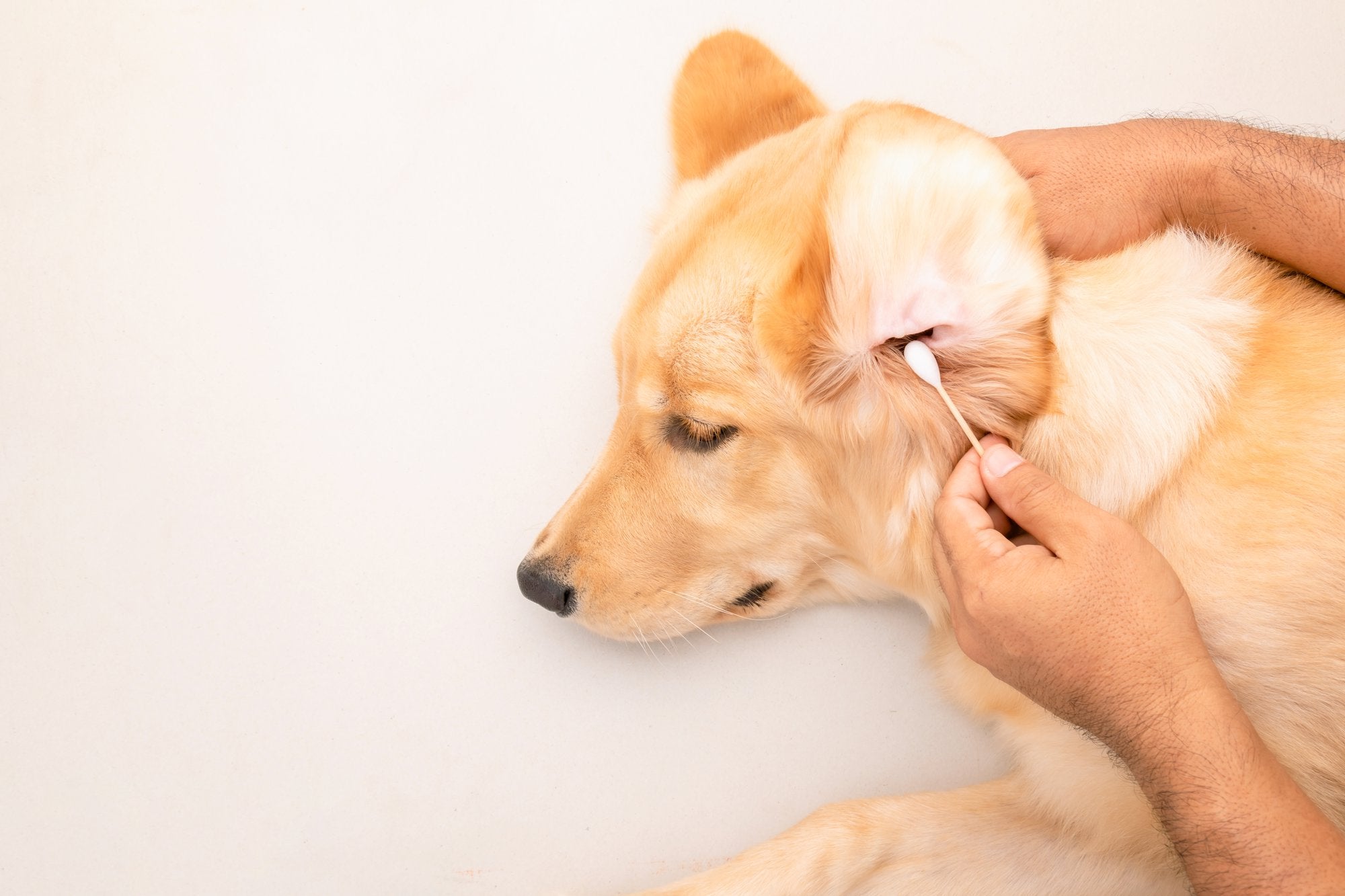One of the most common problems a pet parents might face are dog ear infections. Ear infections in dogs can happen to any dog but it usually happens in dogs with floppy ears, like the Beagles, Basset Hounds, and Poodles.
According to the American Kennel Club, approximately 20% of dogs suffer from some kind of ear infection that either affects one or both ears. In this article, we’ll explain give an overview of what you should know about dog ear infections, what causes ear infections in dogs, common sigs of ear infections in dogs you might notice, and how to prevent ear infections in dogs.
"Dog ear yeast infections can cause itching, irritation, and an unpleasant odor."
What Causes Ear Infections in Dogs?
Your dog’s ear canal is more vertical than yours, forming an L-shape, making them more prone to ear infections. There are several causes why your dog suffers from ear infections.
Yeast Infection in Dogs Ears
Often, floppy ear dogs experience ear infections due to yeast build-up. Because of the moist environment, a dog’s ears are ideal for fungal yeast to grow. Dog ear yeast infections can cause itching, irritation, and an unpleasant odor. What causes a yeast infection in dog’s ears? According to The Spruce Pets, a yeast infection in dogs ears can be due to allergies, ear mites, the presence of moisture, tumors, and even ear deformities.
Common Dog Ear Infection Causes
- Ear yeast infections
- Bacterial infections
- Physical trauma or injury to the ear canal (like serious scratches)
- Allergies (which causes ear disease in about 50% of dogs with skin allergies and 80% of dogs with food sensitivities)
- Parasites (like ear mites)
- Foreign bodies (like hair) stuck in the ear canal
- Genetics
- Hormone imbalances
- Autoimmune disorders
- Tumors or polyps
- Endocrine disorders, such as thyroid disease
According to the American Society for the Prevention of Cruelty to Animals, aside from these causes, dog ear infections can also be triggered by factors that include the buildup of earwax, the presence of excess hair in the ear canal, the presence of moisture (an excellent environment for bacteria and yeast to thrive), or excessive cleaning.
Signs of Ear Infection in Dogs
What are the signs your dog has an ear infection? Aside from excessive buildup of wax, discharge in the ear canal, and crusting or scabs in the ears, most dogs do not show any symptoms of ear infection at all. However, signs of an ear infection in dogs may be visible as signs of discomfort. The following are signs of ear infections in dogs:
- Excessive scratching of the infected ear
- Rubbing infected ear against hard objects
- Head shaking
- Foul odor of the infected ear
- Hair loss around the ears
- Hesitation to chew
- Redness and swelling of the ear canal
- Unusual eye movements
- Loss of balance
If you suspect your dog is suffering from an ear infection and is showing one or more of these signs of dog ear infection, contact your veterinarian as soon as possible. Your vet will be able to give a proper diagnosis and put the right treatment plan. Often, noticing one of these these signs of ear infection in dogs means that your furbaby is uncomfortable. Therefore, it is important to treat dog ear infections as soon as possible.
How to Prevent Ear Infections in Dogs
Prevention is always better than cure. No pet parent would want to see their dog get miserable because of ear infections. Here are some preventive ways to steer clear of it:

Keep Your Dog's Ears Dry
As mentioned, moisture in the ear canal is an excellent breeding ground for yeast and bacteria. After a bath or a swim, make sure to clean your dog’s ears after water exposure to sufficiently remove any trapped moisture inside.
Dr. Jill Abraham of the Blue Pearl Veterinary Partners advises placing a cotton ball in the ears during bath time to keep them dry. There is no need to place the cotton ball deep in the ear of your furbaby, placing it in the opening of the ear would do. After the bath, remove the cotton ball and dry it in and out of the flap and around the ear canal.
Clean Your Dog's Ears Regularly
The general rule is that you should clean your dog’s ears at least once a month. However, when it comes to preventing ear infections in dogs, cleaning more often is better! Especially for dogs with floppy ears or dogs who are frequent swimmers, you should consider clean your dogs ears every week or even every day. Be sure to clean after each exposure to water.
Pet WiPees™ Ear Wipes actually reduce bacterial population in a dogs' ears. These targeted wipes contain an enzyme blend and probiotic blend to create a protective barrier to that prevents allergens from staying on the skin. Pet WiPees™ contain vet-approved, pet safe scents and also deodorize smelly dog ears with FurFresh™ Deodorizer. So, by cleaning your dog's ears with these powerful pet wipes, you are not only removing debris, but actually helping to prevent future ear infections.
Remember that your dog’s ears are sensitive and you cannot use just anything to clean them. Using normal dog shampoo, harsh chemicals, or pet wipes that contain parabens or sulfates can trigger irritation in the ear canal and can eventually lead to infection. Pet WiPees™ are free from alcohols, parabens, sulfates, harsh chemicals, and betaine, so you can feel confident knowing that they will not cause irritations or reactions.
Other ear cleaning instructions:
- Gently remove any visible debris or foreign object from the outer ear canal.
- Avoid shoving a cotton ball or Q-tip too far into your dog’s ear.
- Ensure you are using pet-safe cleansers and scents if using ear wipes.
- Trim the hair inside and around your dog’s ear canal. If your dog is anxious, you may opt to visit a professional dog groomer.
Consider Supplements
Supplements can help you in preventing ear infections in your dog. If an allergy is the principal cause of your dog’s ear infections, allergy supplements may help, such as Pet Parents® Allergy SoftSupps®. These supplements can help reduce inflammation associated with allergies that may reduce the chances of your dog developing ear infections.
Scientifically proven to be a stronger, more effective ingredient, Pet Parents® Allergy SoftSupps® contains Bio-Mos® that helps fight allergies and promotes a healthy immune system in all dogs. These supplements also contain natural active ingredients such as Wild Alaskan Salmon Oil which is rich in Omega-3 fatty acids.
Can probiotics help dog ear infections? According to Happy Natural Dog, providing probiotics for dogs will help boost your dog’s immune system. Probiotics allow your dog to recolonize their intestines with good bacteria to help fight off future ear infections. Pet Parents® Probiotic SoftSupps® will provide your dog with valuable nutrients that help support their digestive and immune system. These probiotic chews for dogs ear infection contain our powerful 5-strain probiotic blend that helps your dog’s body to absorb essential nutrients.
Note: Probiotics and antibiotics should not be mixed. If your furbaby is currently on antibiotics for a dog ear infection, wait until they have completed their treatment to begin using probiotics to help prevent ear infections.
Dog ear infections are common and can recur from time to time. Fortunately, you are equipped now with ways to prevent a dog ear infection. Now you know what causes ear infections in dogs, common signs of ear infections in dogs, and how to prevent ear infections in dogs. So, you can take steps you can take to alleviate symptoms of a dog ear infection, minimize severity, and prevent a future dog ear infection.









